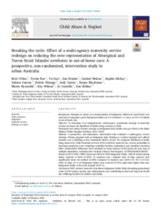Abstract
Background
Strategies to reduce over-representation of Indigenous children in out-of-home care must start in pregnancy given Indigenous babies are 6 % of infants (<1 year), yet 43 % of infants in out-of-home care.
Objective
To determine if an Indigenous-led, multi-agency, partnership redesign of maternity services decreases the likelihood of babies being removed at birth.
Participants and setting
Women carrying an Indigenous baby/babies who gave birth at the Mater Mothers' Public Hospital, Brisbane (2013–2019).
Methods
A prospective, non-randomised, intervention trial evaluated a multi-agency service redesign. Women pregnant with an Indigenous baby birthing at a tertiary hospital were offered standard care or Birthing in Our Community (BiOC) service. The authors compared likelihood of babies being removed by Child Protection Services (CPS) at birth by model of care. Inverse probability of treatment propensity score weighting controlled baseline confounders and calculated treatment effect. Standardized differences were calculated to assess balance of risk factors for each copy of multiple imputation. Australian New Zealand Clinical Trial Registry, ACTRN12618001365257.
Results
In 2013–2019, 1988 women gave birth to 2044 Indigenous babies, with 40 women having babies removed at birth (9 BiOC, 31 standard care). Adjusted odds of baby removal were significantly lower for mothers in BiOC compared to standard care (AOR 0.37, 95 % CI 0.16, 0.84). In total, 2.0 % of Indigenous babies were removed by CPS; eight times higher than non-Indigenous babies at the same hospital (0.25 %).
Conclusions
BiOC reduced removals of newborn Indigenous babies likely disrupting generational cycles of CPS contact, trauma, and maltreatment, and contributing to short and long-term health and wellbeing benefits for mothers and babies.

